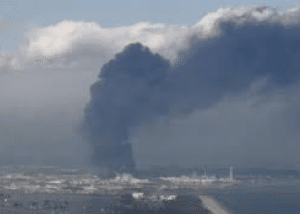 Japan’s struggle to avoid full-on meltdown at nuclear reactors that lost cooling power after the quake. The shutdown of major Japanese oil refineries. Both raise questions that scream for answers about corporate and government behavior.
Japan’s struggle to avoid full-on meltdown at nuclear reactors that lost cooling power after the quake. The shutdown of major Japanese oil refineries. Both raise questions that scream for answers about corporate and government behavior.
Japan’s nuclear plants closest to the 8.9 quake and tsunami seem to be destabilizing fast. The best the nation’s nuclear agency could say Wednesday was that the most damaged reactor, near Tokyo, was not in “imminent danger” of a full core meltdown. Emergency workers flooded the #1 reactor at the Fukushima Daiichi plant with corrosive seawater, permanently ruining its innards in last-ditch efforts to prevent meltdown following an explosion at or near the reactor itself. (video here)
Something bad was also happening at the Fukushima Daiichi plant’s No. 3 reactor (of 6 total reactors at the complex), possibly a loss of backup power to run coolant into the reactor. 170,000 residents for 12.5 miles around were being chaotically evacuated as officials dithered about how much radiation was being released. Three other reactors were also struggling with cooling systems, and a total of 11 had been shut down–20% of Japan’s electric generation, according the Washington Post.
From the Post story:
The quake disrupted the electric power the reactors used to run their cooling facilities, which pump water into the reactor core to cool the fuel rods there. The reactors switched to backup diesel generators, but the tsunami then swept in and shut down the generators used for the No. 2 reactor at Fukushima Daiichi. The unit then tapped excess steam in the core to power a turbine and switched to battery power, which would last only a few hours.
“There’s a basic cooling system that requires power, which they don’t have,” said Glenn McCullough, former chairman of the Tennessee Valley Authority, who was tracking the Japan situation.
Questions: How much of the reactor crisis is due to a relatively simple loss of electrical power to run the coolant pumps? (The kind of power loss that could happen in a severe hurricane). The most threatened reactor was built by General Electric, a chief proponent of new reactor construction in the U.S. If reliable backup power was the main problem, what does that say about the vulnerability of U.S. plants, new or old? Even junior terrorists could disrupt power supplies.
In a separate development, Japan may have lost a substantial part of its capacity to refine gasoline and diesel fuels. An LA Times story predicted Wednesday that fuel prices could spike in far-flung places as a result:
Industry experts say that if Japan can’t get its refineries back on line quickly, there will be a spike in that country’s demand for gasoline, diesel and jet fuel. Global suppliers, including refineries in California, may find it more profitable to increase shipments to Japan instead of selling the fuel domestically, resulting in a bidding-up of prices.
Question: Oil refineries on the U.S. West Coast are, as of the last federal report, running at less than 82% of their available capacity. The figures are similar at some Gulf Coast refineries and in Europe. Will they ramp up to to supply Japan, or will they lick their chops at the chance to profit in the U.S. from shortage instead?
Gasoline would get somewhat more expensive in Japan in either case because of transit costs, but refiners, including the major oil companies, have the ability to prevent further spiking of fuel prices in the U.S. or even worldwide. Yet if the price spikes that followed Hurricane Katrina in 2005 andrefinery outages in 2007 are any guide, greed is likely to win.
Japan’s nuclear officials are not being free with information, and seem behind the curve in reacting to the seriousness of their problem. It may be a long time before we know exactly what happened at the reactors.
But the gasoline shortage issue is an easy one. The giant corporations that profit so handsomely from spiking oil prices have the ability to supplement Japan’s gasoline without choking U.S. supplies. It may be up to the White House to make sure they do it.
For more information on gasoline prices, see OilWatchdog’s Five Ways to Cut Gasoline Prices.







